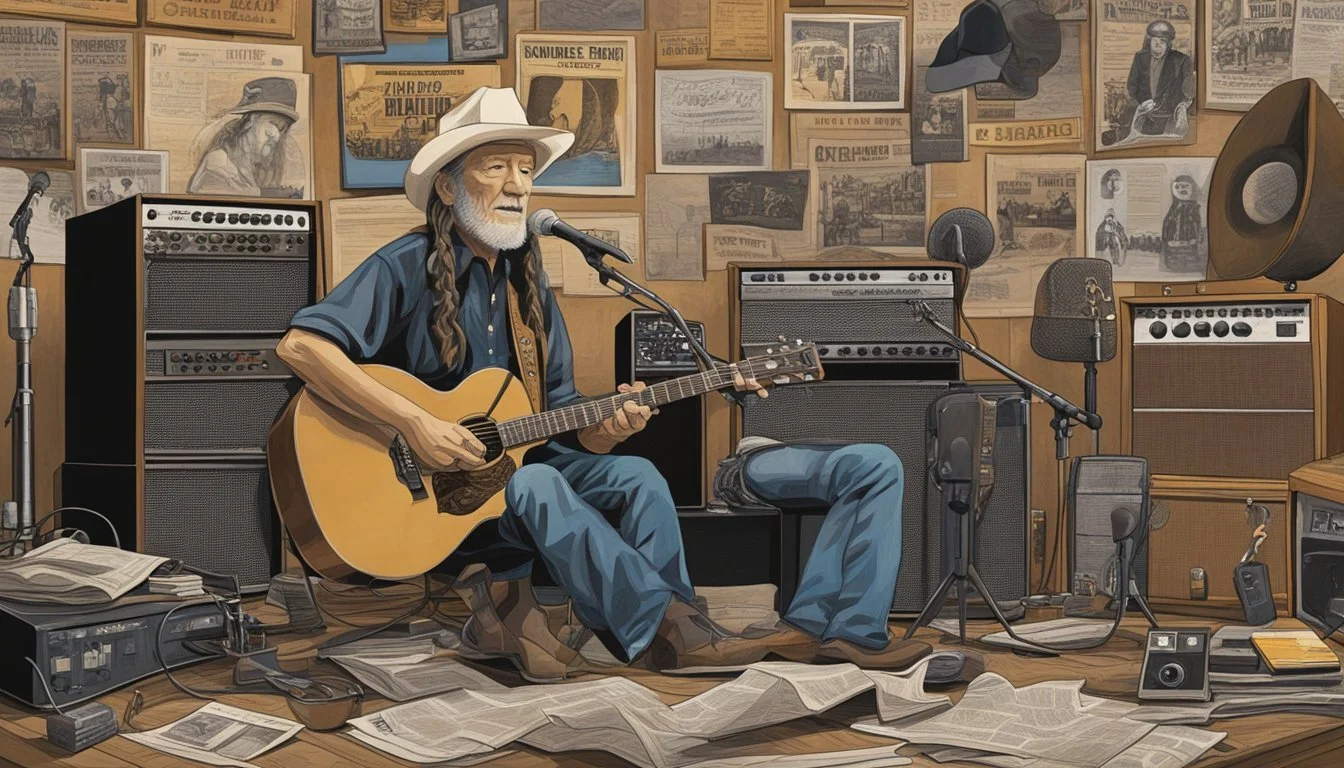Willie Nelson & Family: A Journey Through Evolving Musical Styles
Willie Nelson's musical journey spans over six decades, marked by significant style changes that have cemented his status as a country music icon. The new documentary series "Willie Nelson & Family" offers an in-depth look at these transformations, showcasing Nelson's evolution from Nashville songwriter to outlaw country pioneer and beyond.
The four-part docuseries explores Nelson's genre-bending approach, which has incorporated elements of jazz, folk, and rock into his distinctive country sound. Through rare footage and interviews with fellow musicians like Dolly Parton and Kenny Chesney, viewers gain insight into Nelson's creative process and the influences that shaped his unique musical identity.
"Willie Nelson & Family" not only chronicles the artist's professional growth but also delves into his personal life and the role his family has played in his career. The series, which premiered on Paramount+ in December 2023, provides a comprehensive portrait of Nelson's impact on American music culture and his enduring legacy as a songwriter and performer.
The Evolution of Willie Nelson's Music
Willie Nelson's musical journey spans decades, encompassing diverse styles and influences. His sound evolved from traditional country roots to genre-defying experimentation.
Early Influences and Abbott, Texas Roots
Willie Nelson's musical foundation was laid in Abbott, Texas. He grew up listening to country, gospel, and blues on the radio. His grandfather taught him guitar at age six, sparking a lifelong passion.
Nelson performed in local bands as a teenager. He absorbed the honky-tonk style prevalent in Texas dance halls. This early exposure shaped his distinctive guitar playing and vocal phrasing.
The church also played a significant role in Nelson's musical development. Gospel hymns influenced his songwriting and vocal style.
The Nashville Sound and Columbia Records Era
Nelson moved to Nashville in 1960, seeking success as a songwriter. He penned hits for other artists, including "Crazy" for Patsy Cline.
As a recording artist, Nelson initially conformed to the polished "Nashville Sound." This style favored lush orchestrations and smooth vocals.
Columbia Records signed Nelson in 1961. His early albums with the label adhered to commercial country conventions. However, Nelson's unique vocal style and offbeat phrasing set him apart.
The Outlaw Movement and Red Headed Stranger
By the 1970s, Nelson grew frustrated with creative restrictions. He returned to Texas and embraced a rawer sound.
Nelson became a key figure in the Outlaw Country movement. This subgenre rejected Nashville's slick production in favor of a grittier, more authentic approach.
1975's "Red Headed Stranger" marked a turning point. The concept album featured sparse arrangements and Nelson's weathered vocals. It became a critical and commercial success, cementing Nelson's artistic independence.
Later Years and Genre Crossovers
Nelson's later career is characterized by musical exploration. He collaborated with artists across genres, from jazz to reggae.
His 1978 album "Stardust" showcased Nelson's interpretations of pop standards. It demonstrated his versatility and broadened his audience.
Nelson continued to release country albums while venturing into other styles. He recorded duets with pop stars and explored world music influences.
Recent projects have included tributes to other artists and original material. Nelson's willingness to experiment keeps his music fresh and relevant.
The Impact of Family on Willie Nelson's Career
Willie Nelson's family played a crucial role in shaping his musical journey and career. Their influence extended beyond personal support to direct musical contributions and collaborations.
Bobbie Nelson's Contributions
Bobbie Nelson, Willie's older sister, became an integral part of his band and sound. She joined Willie's touring group in 1973, playing piano and keyboards. Her distinctive style added depth and richness to Willie's recordings and live performances.
Bobbie's piano work complemented Willie's guitar playing, creating a unique musical blend. She appeared on many of his albums, including the critically acclaimed "Red Headed Stranger" in 1975.
The siblings' musical connection dated back to their childhood, when they learned to play instruments together. This early bond translated into a lifelong musical partnership that enhanced Willie's career for decades.
Musical Collaborations within the Family
Willie Nelson frequently collaborated with family members, strengthening his musical output and appeal. His sons Lukas and Micah Nelson became accomplished musicians in their own right.
Lukas Nelson often joined his father on stage and in the studio. Their duets and joint performances showcased a generational blend of talent. Micah Nelson contributed his unique musical style to various projects with his father.
These family collaborations extended Willie's musical range and helped him connect with younger audiences. The Nelson family band became a staple at concerts, demonstrating the enduring power of their musical legacy.
Collaborations and Relationships with Other Artists
Willie Nelson's career has been marked by numerous collaborations and enduring friendships within the music industry. His partnerships have spanned genres and generations, showcasing his versatility as an artist.
Duet Partnerships and Mentorship
Willie Nelson's duet partnerships have produced some of country music's most memorable recordings. He has collaborated with artists across various genres, from country to pop and rock. His duet with Julio Iglesias, "To All the Girls I've Loved Before," became an international hit in 1984. Nelson has also worked extensively with Merle Haggard, releasing multiple albums together.
Nelson's mentorship of younger artists has been significant. He has recorded with Kenny Chesney, including their duet "That Lucky Old Sun" in 2008. This collaboration highlighted Nelson's influence on newer generations of country performers.
Friendship with Dolly Parton and Other Icons
Willie Nelson and Dolly Parton share a friendship that spans decades. They have performed together numerous times, including their duet "Everything's Beautiful (In Its Own Way)." Their rapport on and off stage has endeared them to fans.
Nelson's circle of friends includes many country music legends. He formed The Highwaymen supergroup with Johnny Cash, Waylon Jennings, and Kris Kristofferson in 1985. This collaboration produced three albums and multiple tours, cementing their status as country music icons.
Willie Nelson's Role in Music Advocacy
Willie Nelson has been a tireless advocate for musicians and farmers throughout his career. His efforts have focused on supporting rural communities and protecting artists' rights.
Farm Aid and Support for Farmers
Willie Nelson co-founded Farm Aid in 1985 to raise awareness about the plight of family farmers. The annual benefit concert has raised over $60 million to promote family farm-centered agriculture. Nelson has testified before Congress on behalf of farmers and lobbied for policies to support small farms.
Farm Aid provides grants to organizations that help farmers in crisis and promote sustainable farming practices. The concert series features performances by Nelson and other prominent musicians. It has become one of the longest-running benefit concerts in the U.S.
Nelson's commitment to this cause stems from his own rural upbringing in Abbott, Texas. He has used his platform to spotlight issues facing America's heartland for decades.
Advocacy for Music Education and Artists' Rights
Nelson has championed music education programs in schools. He has donated instruments and supported initiatives to keep music in the curriculum. His Willie Nelson Music Company provides resources for aspiring musicians.
As a songwriter, Nelson advocates for fair compensation and copyright protection. He has spoken out against corporate consolidation in the music industry. Nelson supports organizations that provide healthcare and retirement assistance to aging musicians.
His efforts extend to promoting new talent. Nelson frequently collaborates with younger artists and features them at his shows. This helps expose emerging musicians to wider audiences.
The Media's Portrayal of Willie Nelson
Willie Nelson's media portrayal has evolved over the decades, reflecting his enduring influence on American music and culture. Documentaries, interviews, and film festival appearances have contributed to shaping the public's perception of this iconic singer-songwriter.
Coverage in Documentaries and Docuseries
The recently released "Willie Nelson & Family" docuseries on Paramount+ offers an in-depth look at Nelson's life and career. This production presents an unflinching yet affectionate portrait of the country music legend. It explores his musical journey, personal struggles, and lasting impact on the industry.
Previous documentaries have focused on specific aspects of Nelson's career. These include his role in the outlaw country movement and his environmental activism. Such films often highlight Nelson's unconventional approach to music and his ability to transcend genre boundaries.
Representation in Interviews and at the Sundance Film Festival
Willie Nelson's media appearances consistently showcase his laid-back persona and quick wit. In interviews, he often discusses his passion for music, marijuana advocacy, and environmental causes. His candid responses and humorous anecdotes have endeared him to journalists and audiences alike.
Nelson's presence at the Sundance Film Festival has further cemented his status as a cultural icon. His appearances there, whether for music documentaries or film projects, generate significant buzz. These events provide platforms for Nelson to discuss his artistic vision and social views with a diverse audience.
Adaptation and Resilience During the Pandemic
Willie Nelson and his family demonstrated remarkable flexibility in response to COVID-19 challenges. They adapted their musical approach and found innovative ways to connect with fans despite restrictions.
Changes to Live Performances and Fan Interaction
The pandemic forced Willie Nelson to cancel traditional concert tours. He shifted to intimate, socially-distanced outdoor shows when possible. These smaller gatherings allowed for a more personal connection with fans in attendance.
Nelson also embraced drive-in concerts as a safe alternative. Attendees remained in their vehicles while enjoying live music broadcast through FM radio. This format maintained the live experience while prioritizing health precautions.
The Nelson family expanded their online presence to stay connected with fans. They increased social media activity, sharing behind-the-scenes glimpses of their daily lives and impromptu performances.
Pivoting to Virtual Events and Releases
Willie Nelson embraced technology to bring music to fans' homes. He hosted several livestream concerts, including his annual 4th of July Picnic as a virtual event. These online shows allowed global audiences to enjoy his performances safely.
The family launched "Come and Toke It," a variety show streamed on Twitch. This program featured music, celebrity guests, and cannabis advocacy, reflecting Nelson's interests beyond music.
Nelson continued releasing new music during lockdowns. He recorded albums remotely, collaborating with other artists through digital platforms. This approach resulted in creative projects that might not have happened under normal circumstances.
Behind the Documentary 'Willie Nelson & Family'
The documentary series "Willie Nelson & Family" offers an intimate look at the country music legend's life and career. Acclaimed directors helmed the project, which premiered on a major streaming platform.
The Creative Minds: Thom Zimny and Oren Moverman
Thom Zimny and Oren Moverman directed "Willie Nelson & Family," bringing their unique perspectives to the project. Zimny, known for his work with Bruce Springsteen, and Moverman, an Oscar-nominated filmmaker, combined their talents to create a comprehensive portrait of Nelson.
The directors gained unprecedented access to Willie Nelson's personal archives and conducted extensive interviews with the artist, his family, and collaborators. Their approach blended archival footage with new material, providing a fresh take on Nelson's storied career.
Exploring the Series on Paramount+
"Willie Nelson & Family" debuted on Paramount+ as a four-part documentary series. The platform's release strategy allowed viewers to immerse themselves in Nelson's world at their own pace.
Each episode of the series focused on different aspects of Nelson's life and music. The documentary covered his early struggles, breakthrough successes, and enduring influence on country music and popular culture.
Paramount+ promoted the series as part of its growing collection of music documentaries. The streaming service's commitment to original content made it an ideal home for this in-depth exploration of Willie Nelson's legacy.
Conclusion
Willie Nelson's musical evolution stands as a testament to his artistic versatility and enduring influence. The "Willie Nelson & Family" docuseries offers an intimate look at his stylistic shifts over the decades.
Nelson's legacy extends far beyond country music. His ability to blend genres and experiment with different sounds has cemented his place as a cultural icon.
His impact on American music is undeniable. Nelson's distinctive voice and songwriting have inspired generations of artists across various genres.
The docuseries highlights Nelson's collaborations with diverse musicians, showcasing his broad appeal and musical adaptability. These partnerships have further expanded his cultural influence.
Nelson's willingness to take risks and push boundaries has kept his music fresh and relevant for over six decades. This adaptability has allowed him to connect with new audiences while maintaining his core fan base.
As "Willie Nelson & Family" demonstrates, his musical journey reflects broader changes in American culture. Nelson's career serves as a unique lens through which to view the evolution of popular music.





